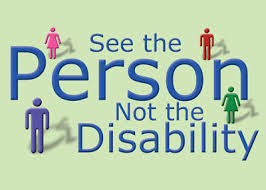Since when did being disabled define a person? It seems as though society believes that having a disability is like carrying a huge sign that says I AM DISABLED, GIVE ME PITY. The disabled are not looking for a pity party where the public tells them everything is going to be all right or how help is right around the corner. I would be lying if I said I had never felt sympathy or judged these people. Even as I was typing that previous sentence, I felt like I was classifying them as a different species by describing them as "these people." Whenever I come across an impaired individual, I am always guilty for instantly having the reaction of feeling sorry for them.
After reading Disability by Nancy Mairs, I finally began to understand the point of view of disabled people. Since I have never had a disability, merely talking about is awkward and uncomfortable. However, Mairs writes with her "unsentimental candor" which gives new insight into the thoughts of the disabled. I never realized how the media rarely portrays the handicapped and even when they do, it usually ends with the cripple getting "[stripped] of even the urge toward independence" (Mairs 14). TV shows and movies "exclude the complexities that round out a [disabled] character" (14) and depict them as weak, dependent beings who need constant support and encouragement. These stereotypes of being sick or not being able to lead a productive life are the thoughts that cause an impaired person to feel "self-degradation and a subtle kind of self-alienation not unlike that experienced by other minorities" (14). This negative self-fulfilling prophecy is exactly what Nancy Mairs wants demolished. She desires for a society that integrates any type of person into "common scenes of our ordinary lives" (15).
At the end of the day, we are all regular people fighting to survive in the harsh reality called civilization. Disability is just a matter of perception, you can choose to accept it or be scared by it.

